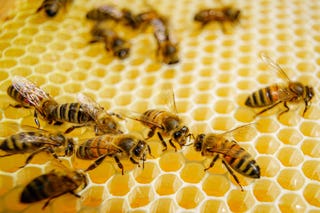[ad_1]

Social bees journey higher distances for pollen and nectar than their solitary counterparts, based on scientists.
Researchers from the College of Bristol have discovered that social bees – resembling Bumble bees and Honey bees – have bigger foraging ranges in comparison with solitary bees – resembling Miner and Mason bees.
The consultants stated their findings, revealed within the journal Present Biology, might have implications for monitoring pollination in addition to conservation methods for bees and crops.
Lead creator Dr Christoph Grueter from Bristol’s Faculty of Organic Sciences, stated: “Since there shall be a giant worldwide push for reforestation and rewilding, this may assist us perceive how reforestation and rewilding tasks may have an effect on and be affected by totally different pollinator teams.
“Their social way of life signifies that bee colonies gather meals over a a lot bigger space than solitary bees.
“This helps us to plan efficient conservation methods to assist each bees and the crops they pollinate.”
There are round 270 bee species in Britain, slightly below 250 of that are solitary bees.
Social bees are a part of colonies that make honey and wax of their hives.
Solitary bees, then again, gather pollen and nectar from flowers for his or her eggs, which they lay in holes underground on inside wooden.

There are a number of traits that assist social bees journey higher distances – resembling physique dimension and colony dimension.
These bees additionally are inclined to deal with flower species which might be extra rewarding and journey higher distances to seek out these flowers.
For the examine, the scientists used current information on bee foraging distances of 90 bee species to develop a pc simulation.
Dr Christoph Grueter stated: “Our findings recommend that solitary bees is perhaps most affected by human-caused habitat loss and fragmentation as a result of they are going to battle extra to seek out appropriate meals sources at higher distances.
“Social bees is perhaps notably vital for the safety of endangered plant species that exist solely in remoted patches.
“Since many social bee species might be stored in hives, we might use our understanding of their foraging ranges in focused methods to assist the pollination of crops in distant areas.”
[ad_2]
Source link


Neue Kommentare